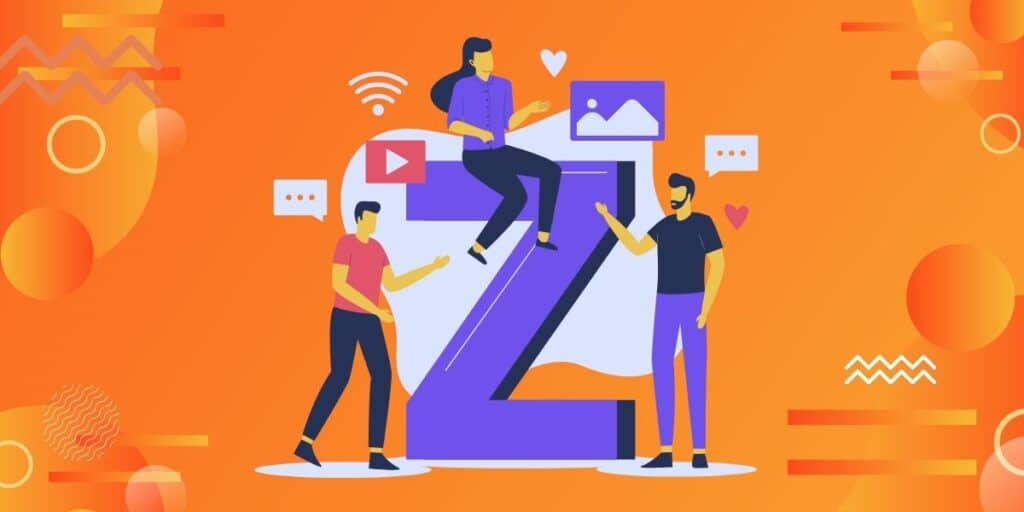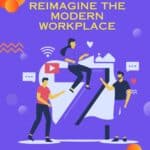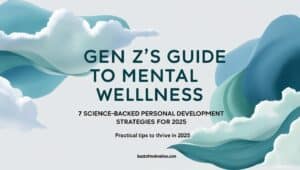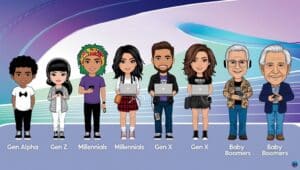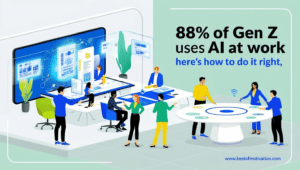Generation Z, the cohort following Millennials, is making a significant impact on today’s workplace landscape. With their distinct values and characteristics, this generation, born between 1995 and 2009, is reshaping traditional notions of work and success. Unlike their predecessors, Generation Z approaches careers with a fresh perspective, prioritizing flexibility, diversity, and a strong sense of purpose in the workplace.
Members of Generation Z have transitioned into the workforce, outnumbering Baby Boomers and influencing the dynamics of modern organizations. Their digital nativity and entrepreneurial spirit bring innovative ideas and a tech-savvy approach to problem-solving. Understanding how to engage and empower this generation is becoming crucial for businesses striving to stay competitive and relevant in a rapidly evolving market.
As we dive deeper into the rise and influence of Generation Z in the modern workplace, we’ll explore how companies can adapt their strategies to attract, retain, and inspire this generation of talent. Stay tuned for insights on navigating the changing landscape of work culture and harnessing the potential of Generation Z to drive future success.
Understanding Generation Z
Generation Z, the cohort born between the mid-1990s and the early 2010s, is making a significant impact on the modern workplace. Understanding the traits and preferences of this generation is crucial for employers looking to attract and retain top talent. Let’s delve into two key aspects that define Generation Z in the workplace.
Digital Natives
Generation Z is often referred to as digital natives due to their upbringing in a tech-savvy era. This influences various aspects of their work style, communication preferences, and approach to technology in the workplace. They are adept at leveraging digital tools for increased efficiency and productivity. Whether it’s collaborating on projects through online platforms or using instant messaging for quick communication, Generation Z values seamless and tech-driven processes. Employers can harness this penchant for technology by providing innovative digital solutions that streamline work processes and foster collaboration.
Work-Life Balance
Work-life balance is a core value for Generation Z, shaping their expectations from employers and the overall workplace environment. Unlike previous generations, they prioritize personal well-being and seek workplaces that support a healthy balance between work and life commitments. This emphasis on work-life balance influences their decision-making when choosing employers and can impact their loyalty to a company. Employers who promote flexible working hours, remote work options, and employee wellness initiatives are more likely to attract and retain top Gen Z talent. By creating a supportive work environment that values personal time and well-being, organizations can foster a motivated and engaged workforce.

Impact of Generation Z in the Workplace
In today’s modern workplace, the influence of Generation Z is reshaping traditional structures and practices. Let’s delve into two key aspects that highlight the impact of this tech-savvy and collaborative generation.
Collaboration and Diversity
Generation Z, known for its collaborative nature, brings fresh perspectives and a strong focus on diversity and inclusion. This dynamic approach fosters innovation within the workplace, breaking down barriers and encouraging a mix of ideas from individuals with unique backgrounds and experiences. By valuing diversity, Generation Z is transforming work cultures into more inclusive and vibrant environments where creativity thrives.
Tech-Savvy Contributions
One of the defining traits of Generation Z is their inherent comfort with technology. Their tech-savvy skills play a significant role in driving digital transformation within organizations. By leveraging their digital proficiency, Generation Z employees contribute to enhancing productivity and efficiency in the workplace. Their adeptness with digital tools and platforms enables them to streamline processes, adapt to new technologies swiftly, and find innovative solutions to complex challenges.
Adapting to Generation Z
Generation Z brings a fresh perspective and unique preferences to the modern workplace. Understanding and adapting to these preferences is crucial for employers to attract, retain, and engage this tech-savvy generation effectively. Let’s explore two key areas where employers can tailor their approach to accommodate Generation Z employees:
Flexible Work Arrangements
Embracing flexible work arrangements is essential to meeting Generation Z’s expectations for work-life balance and autonomy. To resonate with Generation Z’s preference for a hybrid or remote work environment, companies can consider the following strategies:
- Implement Virtual Collaboration Tools: Introduce digital platforms that facilitate seamless communication and teamwork, allowing Gen Z to collaborate efficiently regardless of their location.
- Offer Flexi-Time Schedules: Allow employees to set their work hours within a certain range, empowering Generation Z to work at times when they are most productive.
- Create a Dynamic Workspace: Design a workspace that supports both collaborative projects and individual tasks, catering to Gen Z’s need for versatility in their work environment.
Career Development Opportunities
Generation Z values continuous learning and seeks career advancement opportunities. Employers can foster professional growth among Gen Z employees by implementing the following initiatives:
- Establish Mentorship Programmes: Pair Generation Z employees with experienced mentors who can provide guidance, support, and career advice, helping them navigate their professional journey.
- Offer Skills Training Workshops: Provide regular workshops and training sessions to help Gen Z develop new skills, stay updated with industry trends, and enhance their capabilities.
- Encourage Goal Setting: Encourage Gen Z employees to set clear career goals and support them in creating a personalised development plan to achieve those goals.
By incorporating flexible work arrangements and career development opportunities tailored to Generation Z’s preferences, employers can create a workplace environment that attracts, retains, and motivates the next generation of talent.
Future Outlook
As Generation Z continues to make its mark in the modern workplace, it’s essential to consider the future outlook and anticipate how its influence will shape organizational dynamics and practices in the coming years.
Leadership Roles
The trajectory of Generation Z into leadership positions within companies is a topic of growing interest. With their unique perspectives and digital nativity, there is a likelihood of Generation Z individuals taking up key leadership roles in the future. Their leadership style may differ significantly from previous generations, focusing more on collaborative decision-making, inclusivity, and leveraging technology to drive innovation. Companies must prepare for this shift by nurturing these leaders and providing them with the tools and resources to succeed in their roles effectively.
Organizational Adaptation
Organizations are facing the challenge of adapting their structures and practices to meet the evolving needs and expectations of Generation Z employees. These digital natives thrive in environments that promote flexibility, work-life balance, and a sense of purpose. Companies need to embrace a more agile approach, rethinking traditional hierarchies and bureaucratic processes. By fostering a culture of transparency, open communication, and continuous feedback, organizations can create an inclusive and empowering environment that caters to the preferences of Generation Z.

Conclusion
Generation Z is not just the future; they are the present workforce, bringing with them a fresh perspective on careers and success. Organizations that fail to understand and adapt to the characteristics and preferences of Gen Z risk falling behind in the ever-evolving workplace landscape.
As digital natives, Gen Z values diversity, inclusivity, and work-life balance. They seek meaningful work, personal development opportunities, and a collaborative environment that values their input. To harness the full potential of this generation, companies must embrace flexibility, innovation, and technology in their operations.
By recognizing the rising influence of Generation Z and tailoring strategies to meet their needs, businesses can foster a dynamic and engaged workforce that drives organizational success in the modern era. Embracing change and cultivating a culture that resonates with Gen Z’s values will undoubtedly pave the way for a prosperous future in the workplace.
Related Links:
